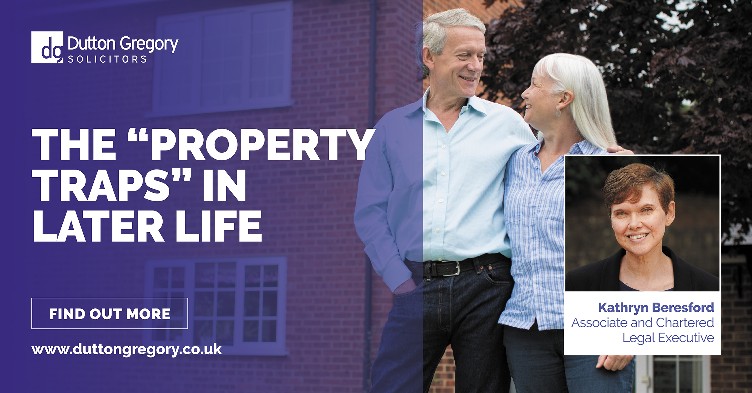There are a variety of different ways co-owners can own property, often with very valid reasons for individual circumstances. However, it is vitally important that you understand the pros and cons of such decisions, especially in later life. Wills & Probate specialist Kathryn Beresford explains more.
Jointly Owned Property
When a spouse passes away, their estate may automatically pass to their surviving spouse without the need for a Grant of Representation to administer the estate. If a property is ‘jointly owned’, it is mistakenly believed that no action is necessary, but the title of ownership at the Land Registry needs to be updated and transferred into the survivor’s sole name.
Why? If a property has two named owners on its title, it can be difficult to sell and this may present problems, particularly if the survivor has moved into a care home and needs the money to pay for care fees.
Individually Owned Property
If one spouse passes away and leaves the marital home in their name to the other the process can be more complicated and the Personal Representatives will need to apply for a Grant of Representation.
Also, if the sole owner of that property moves into a care home, and the other feels the property they shared has become too large for them to manage, the remaining party may not be able to sell the property, and purchase a replacement, even if they hold a Power of Attorney. Instead, there may need to be an application to the Court of Protection for approval, which takes time and money.
‘Tenants in Common’
If a couple owns a property as ‘Tenants in Common’, each party owns a share, which might be half or a specific percentage. When the first spouse dies, their share can be held in Trust for their chosen beneficiaries by creating a ‘Life Interest Trust’ in their Will, whilst the survivor has the benefit of continuing to live in the family home for life (often subject to certain conditions) if they choose to do so. On the death of the surviving spouse, the property passes to the beneficiaries.
Not only does this protect the surviving spouse’s place to live, but should they need to move into residential care, the first spouse’s share will pass to the beneficiaries when the surviving spouse dies (known as the life tenants), such as children, and not used to pay care fees.
For unmarried couples, this may affect the inheritance tax position.
Although there are often good reasons for property to be owned in one person’s name or jointly, it is recommended this is kept under review and appropriate advice needs to be taken should circumstances change.
If you need advice on the ownership and interests of your property, Kathryn can be contacted on 01962 624474 or at k.beresford@duttongregory.co.uk








